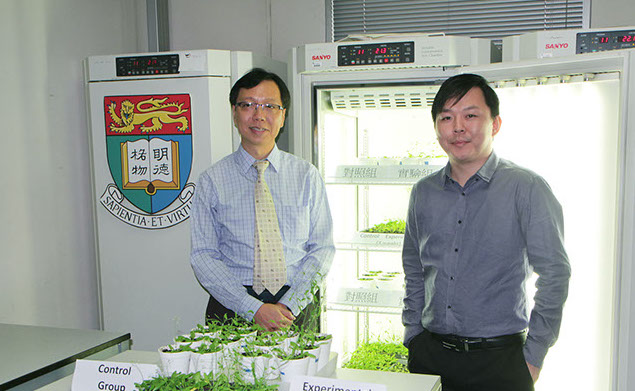
Dr Wallace Lim Boon-leong (left) with his former PhD student Dr Law Yee-song (right) from the School of Biological Sciences.

A Gene of Productivity
Botanists in the School of Biological Sciences have uncovered a technology to make plants grow faster, and their discovery has implications for alleviating climate change, reducing food shortages and enhancing the production of biofuel.
The team’s approach is two-pronged: one, enable plants to grow faster – with the implication of cultivating more food; and two, because the plants grow faster, the rate at which they absorb carbon dioxide also increases – with the implication for thereby reducing CO2 in the atmosphere.
Led by Dr Wallace Lim Boon-leong and his former PhD student Dr Law Yee-song, the team identified Purple Acid Phosphatase 2 (PAP2) as a gene that promotes plant growth. By over-expressing it in two energy-generating organelles of plant cells, chloroplasts and mitochondria, they promoted faster cultivation. In the tests, the model plant Arabidopsis thaliana not only grew faster but its seed yield increased by 38 to 57 per cent.
“Chloroplasts carry out photosynthesis, a process that fixes CO2 in the atmosphere into sugars using solar energy,” said Dr Lim. “The sugars are then used for plant growth, or consumed by mitochondria to produce adenosine triphosphate (ATP), an important energy source for many cellular processes. Basically, the process produces higher sugar so plants grow faster.”
He noted that PAP2 homolog is found in the genomes of all plant species, as well as in photosynthetic green algae in the ocean. “Algae absorbs a great deal of CO2 in the ocean,” he said. “Hypothetically, if we could make algae grow faster, thereby increasing their amount in the ocean, we could absorb more CO2. However, since it would involve genetic modification of algae, I don’t think people would agree with this strategy.”
Dr Lim explained that his team made the discovery about the gene almost by accident. “While doing other research on other PAPs we noticed that PAP2 is unique because the protein sequence has an additional tail not found in other members of this gene family. I was curious about it, so we tried to over-express it in a model plant and to our surprise the plant grew faster. The big question was why?
“We worked out that the tail enabled it to anchor on to the outer membranes of chloroplasts and mitochondria,” said Dr Lim, adding: “Sometimes scientific discovery comes from nowhere! Since the PAP2 gene is found in most plants and in algae, you could call it the ‘gene of productivity’.
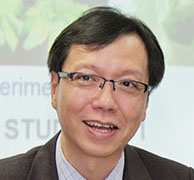
![]() Sometimes scientific discovery comes from nowhere! Since the PAP2 [Purple Acid Phosphatase 2] gene is found in most plants and in algae, you could call it a ‘gene of productivity’.
Sometimes scientific discovery comes from nowhere! Since the PAP2 [Purple Acid Phosphatase 2] gene is found in most plants and in algae, you could call it a ‘gene of productivity’. ![]()
Dr Wallace Lim Boon-leong
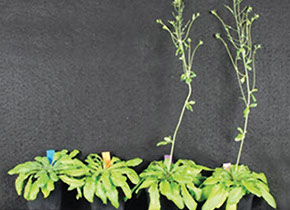
Control
Experimental
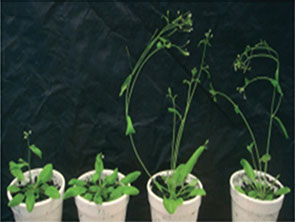
Control
Experimental
8 hours light/ day
6 weeks old
16 hours light/ day
4 weeks old
Arabidopsis over-expressing PAP2 (Experimental) grew faster than the control plants (Control) under both short and long days.
Biofuel breakthrough
It may be possible to use PAP2 to quicken the growth cycle of trees for paper or fuel, and it has other possibilities too. Dr Lim’s team also used it to promote growth in Camelina Sativa, a crop that is being used to create biofuel. “If you squeeze the seeds, lipids come out and these can be converted to biofuel,” he said. “Japan Airlines has tested Camelina-based biofuel in the Boeing 747-300, and the US Navy has tested it to fly the F/A18 and MH-60S Seahawk.”
Following this research on Camelina growth, US company Agragen has licensed the technology and will test plant growth in the field. Dr Lim’s team did the experiments in model conditions, but rigorous outside testing needs to be done to see if it is vulnerable to disease and field conditions.
“We don’t have the resources – either in terms of funding or manpower – to test it properly here,” said Dr Lim. “But if it all works and receives the required approval from the USDA (United States Department of Agriculture) and the USEPA (United States Environmental Protection Agency), then it will be possible to reduce carbon emissions in planes. This is important because, while we can have electric cars, we can never have electric planes – too heavy!
“Camelina Sativa biofuel reduces CO2 emissions by 80 per cent. It does this as follows: when growing as a plant, it absorbs a lot of CO2, when burned as fuel it emits CO2. But the point is it absorbs CO2 in the first place – fossil fuels do not absorb CO2 – just emit it when they are burned. So here at least there is a cycle.”
The findings have been published in eight journals including Plant Physiology, Biofuels and Biotechnology, and Dr Lim reported the findings at two international conferences including the Conference for Plant Mitochondrial Biology held in Poland last year.
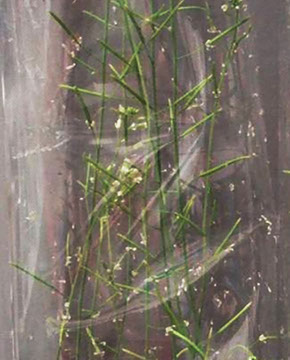
Control
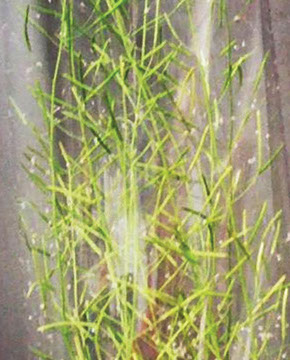
Experimental
Arabidopsis over-expressing PAP2 (Experimental) matured faster and produced 38 to 57 per cent more seeds than the control plants at full maturity.

